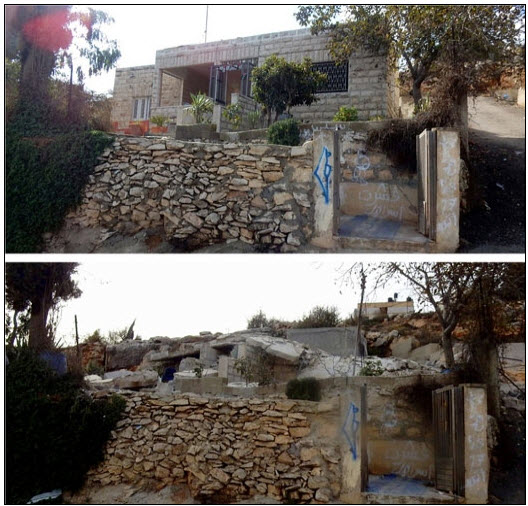Last Sunday, 15 November, a large contingent of Israeli occupation forces entered the Qalandia Refugee Camp in the West Bank in order to demolish by explosives the home of Muhammad Abu Shahin, a Palestinian held on charges of killing Danny Goren, an Israeli, on 19 June 2015. Until the arrest, Abu Shahin lived with his wife and two daughters – both of them minors – in an apartment which he rented from relatives on the top floor of a three-story building. A few days earlier, on 12 November, Israel’s Supreme Court rejected a petition against the planned demolition filed by the human rights organization HaMoked – Center for the Defense of the Individual. Consequently, Abu Shahin’s wife and daughters vacated the apartment and moved into a vacant apartment located on the second floor of the same building.

Home of Mu’az Hamed’s mother and brother in the village of Silwad, 12km northeast of Ramallah, before and after demolition (Photo: B’Tselem)
Just prior to detonating the explosive charges, Israeli forces used loudspeakers to warn residents of nearby houses and instructed them to leave their homes and move about 100 meters away from the center of the blasts. When Abu Shahin’s apartment was blown up, the apartment on the floor below it was also severely damaged, as was an apartment in a nearby building that was home to four people, including two minors. Both apartments are no longer habitable. Another five apartments in nearby buildings were also moderately damaged. Initial information gathered by B’Tselem indicates that while the Israeli security forces were in the refugee camp on their demolition mission, an exchange of gunfire developed between them and local residents; Ahmad Abu al-‘Eish, 30, and Laith As’ad, 20, were killed by Israeli gunfire. Three other Palestinians were taken to hospital after sustaining wounds from live fire or rubber-coated metal bullets. B’Tselem’s investigation of the incident is under way.
The day before, in the early hours of Saturday 14 November, Israeli security forces arrived at the city of Nablus and the village of Silwad, in the District of Ramallah, and blew up five apartments as collective punishment for attacks against Israelis carried out by relatives of the homes’ inhabitants. The force of the blasts severely damaged six other apartments, making them uninhabitable, and caused some damage to another 16 nearby. In Nablus, security forces blew up four apartments that were home to relatives of the three Palestinians suspected of killing the Israeli couple Na’ama and Eitam Henkin on 1 October 2015. This authorized demolition left fourteen persons homeless. However, the force of the blast destroyed another six apartments not slated for demolition, leaving an additional sixteen persons homeless.
This is not the first time B’Tselem has documented the destruction of homes nearby those slated for demolition by detonation. A comprehensive 2004 report by B’Tselem found that, for 295 of the homes destroyed, about half of the homes demolished by Israel from 2001 to 2004, no claim was made that they had housed Palestinian perpetrators of attacks against Israelis. These demolitions left a total of 1,286 people homeless in addition to those whose homes Israel explicitly slated for demolition. In demolitions carried out by Israeli authorities in October 2015, two apartments adjacent to those slated for demolition were also destroyed by the blast.
Since the occupation began, the military has demolished hundreds of homes as a means of punishing the families of Palestinians who carried out attacks against Israelis or were suspected of such actions. This policy has left thousands of people – including young children – homeless, although they themselves were accused of no wrongdoing. In 2005, the military discontinued the policy after a committee in Israel’s security establishment concluded that its liabilities outweighed its benefits. Punitive home demolition of homes was reinstituted in July 2014 after Palestinians abducted and killed three Israeli teenagers in the Bethlehem area, citing the radical change in circumstances as justification for using this measure. From then until the recent events described here, Israel demolished four homes as punishment and sealed another two.
According to B’Tselem “the policy of demolishing the family homes of attackers constitutes collective punishment, which is prohibited under international law. Despite the fact that this measure is extreme and despite the clear view held by legal scholars in Israel and abroad that the it is illegal, it has been repeatedly sanctioned by Israel’s Supreme Court. Demolishing or sealing a home is a draconian and vindictive measure directed at entire families who have done nothing wrong nor are they suspected of any wrongdoing.”
Related:
http://www.btselem.org/punitive_demolitions/20151117_security_forced_demolish_14_homes
http://www.hamoked.org/Document.aspx?dID=Updates1615


